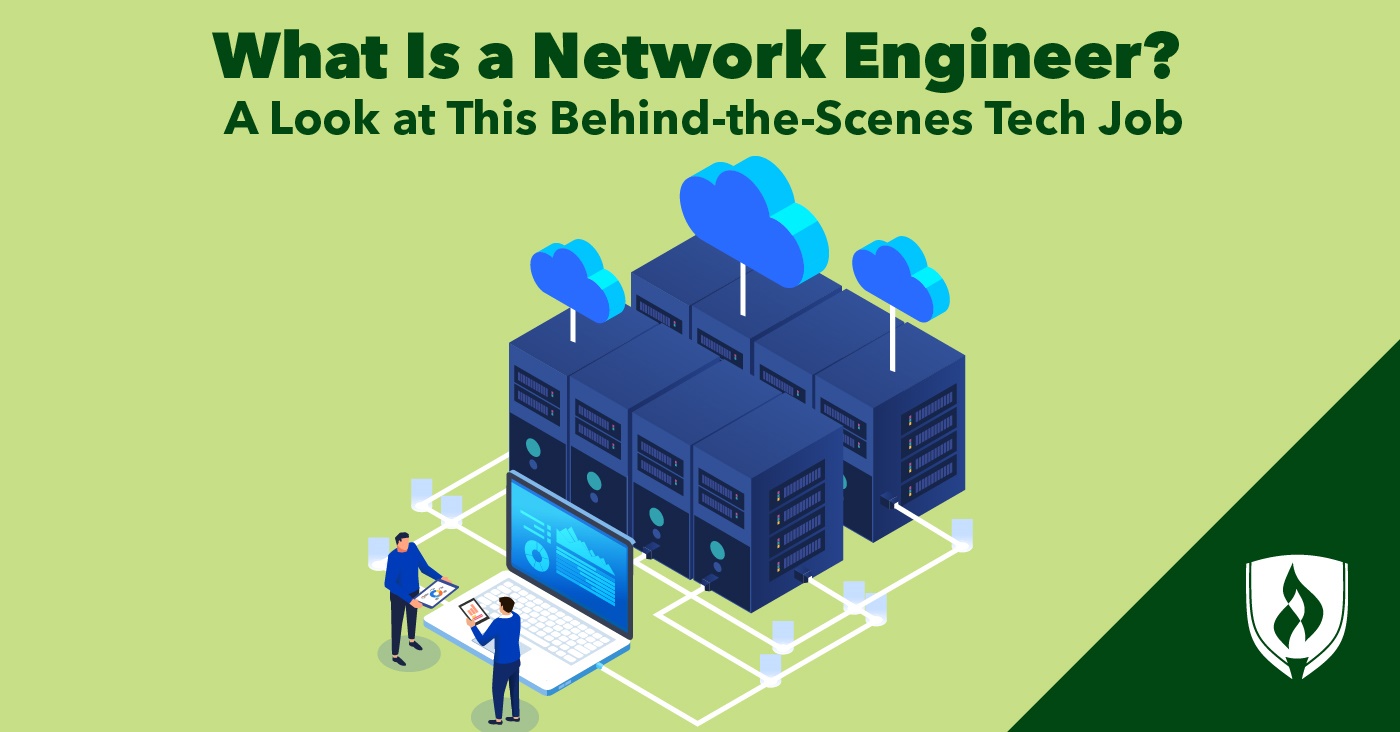What Is a Network Engineer? A Look at This Behind-the-Scenes Tech Job
By Patrick Flavin on 05/02/2022

Everyone knows that we live in the information age. Many of us spend practically every hour of our lives near a device connected to the internet, and huge portions of the labor force depend on reliable internet connectivity to do their jobs. While most of these roles won’t require much more than some basic tech literacy to use their network effectively, it takes skilled IT professionals like network engineers to keep that critical information pipeline flowing for the rest. But what do network engineers do, exactly?
“When describing my job to my family and friends, I try to give them a ground-level idea of what I do,” says Andreas Grant, network engineer and founder of Networks Hardware. “I help companies or organizations set up their internal computer network. You can think of this job as being the architect of computer networks.”
Just like an architect knows the ins and outs of a building project they are designing, network engineers know the ins and outs of computer networks. In a fast-changing IT environment, this requires a complex mix of evolving expertise in order to be effective.
So could the role of a network engineer be in your future? Read on to learn more about what the role entails.
What does a network engineer do?
Network engineers design, set up, develop and maintain computer networks. The one-sentence explanation may sound simple, but it’s also a lot easier said than done. Network engineers need to be able to configure and design network hardware layouts, integrate old and new technology with cloud-based systems, and troubleshoot any problems that may come up. Simply put, network engineers are in charge of doing whatever they can to optimize the networks they are responsible for.
But it isn’t all about you and the machine—there’s a human element to this role as well. “Our job is not all about sitting in front of a computer all day,” Grant says. He explains that engineers will spend a lot of their time on the move interacting with various individuals and systems as they problem solve throughout their day. “We have to be involved with buying the right hardware, installing that hardware and making sure every single device inside that network gets to make the most of it.”
In some organizations, a network engineer has to be a jack of all trades when it comes to managing computer networks—though many organizations also seek out network engineers who focus on specific areas of expertise like cloud networking, network security or wireless networking. Whether it is working with physical hardware, troubleshooting digital issues or interacting with less tech-savvy stakeholders who need a simple explanation, a network engineer must be ready to respond to whatever issue may arise.
Where do network engineers work?
You can find network engineers working practically anywhere that requires a complex computer network. Schools, hospitals, financial firms, and government and commercial offices are all common settings for network engineers to base their workday. Depending on the employer and make-up of the organization’s IT team, it is possible for network engineers to work remotely, though they may need to be available for onsite hardware configuration.
With cloud computing, the prospect of working for a third-party firm that manages several organization’s IT needs with centralized infrastructure may become much more common, and many organizations are moving toward this approach.
What skills do you need to be a network engineer?
Network engineers play an advanced role in an IT team, and it undoubtedly takes a strong mix of technical know-how to be effective. We used analysis software to examine over 175,000 network engineering job postings to help you get a better picture of what employers are looking for in network engineering candidates.
Specialized skills and competencies in demand:1
- Cisco® products
- Python®
- Linux®
- Project management
- Wide area networking
- Java®
- SQL
- Software development
- DevOps
- Routers
- System/network configuration
- Virtualization
- Network troubleshooting
As you can see, the role requires a mix of networking infrastructure and hardware knowledge, as well as the skills needed to oversee applications, virtualization and software-based network needs. While this might seem like an intimidating list to master, keep in mind that network engineering roles may have levels of seniority. A junior-level network engineer might only focus on a smaller subset of responsibilities (like configuring network hardware infrastructure) that grows with time, experience and education.
Ultimately, all of this networking technical knowledge can be learned—but to get there and be effective in this role, you’ll also need the right mentality.
“Network engineering requires analytical thinking, creative problem solving and most importantly, patience,” says Freeman Smith, senior network engineer at Nufactur. He notes that even with the occasional frustrations that come with addressing network problems, the payoff to resolving them can be extremely rewarding and exciting.
Network engineer career outlook
A job that requires a highly technical skillset that can be applied in a wide variety of industries usually makes for a solid career outlook.
In general, the BLS projects employment in computer and information technology occupations to grow by 13 percent from 2020 through 2030.2 While that’s a faster projected rate of growth than the national average, there is a difference for the occupations closely related to network engineering. The BLS projects employment of both network and computer systems administrators and computer network architects to grow by 5 percent during that same period.2 A big part of this less-robust (but still solid) growth projection is tied to changes brought on by cloud computing—there’s less need for IT teams to build a hardware network from the ground up.
How do you become a network engineer?
It should come as no surprise that network engineering roles typically require a strong mix of education and experience. Our analysis of network engineering job postings found that 85 percent were seeking candidates with a Bachelor’s degree.1 Prospective network engineers should pursue an education program focused on information technology to build a foundation of key networking competencies.
This analysis also found many job postings (42 percent) were seeking candidates with three to five years of experience.1 Simply put, this isn’t a role you can typically walk into fresh out of school—you’ll likely need to spend some time learning the ropes working in related roles like junior network/systems administration positions before making the move up.
Take the first step toward becoming a network engineer
Now that you have a better idea of what a network engineer does, you’re that much closer to deciding if this is the right career path for you. The first step to starting an IT networking career is to make sure you have an education that equips you for what lies ahead. If this career path has caught your eye, check out the Rasmussen University Information Technology Management program to learn more about how this fully-online degree program can help you get started.
1Burning-Glass.com (analysis of 176,647 network engineer job postings, Feb. 01, 2021 - Jan. 31, 2022).
2Bureau of Labor Statistics, U.S. Department of Labor, Occupational Outlook Handbook, [accessed April 2022] www.bls.gov/ooh/. Information represents national, averaged data for the occupations listed and includes workers at all levels of education and experience. This data does not represent starting salaries. Employment conditions in your area may vary.
Cisco is a registered trademark of Cisco Technology, Inc.




